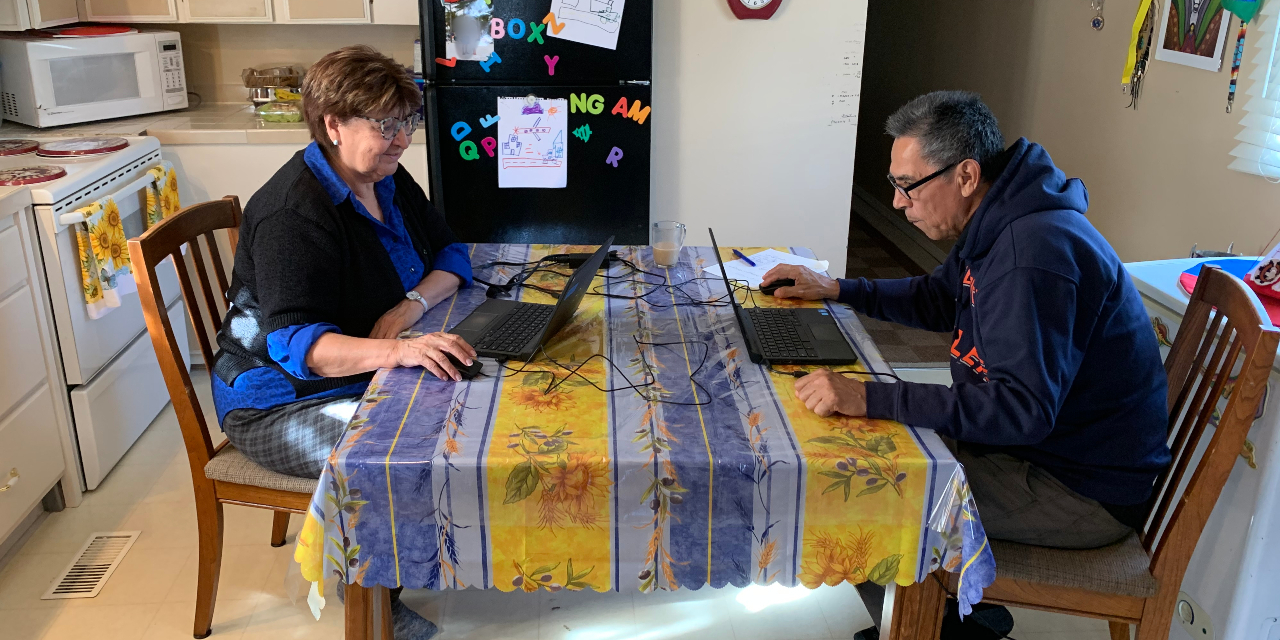Videos going viral aren't exactly familiar territory for Elder Francis Whiskeyjack and Elder Elsey Gauthier, but in March they got first-hand experience.
When COVID-19 restricted the support the Elders normally provide to students through First Peoples' House at the University of Alberta, Whiskeyjack and Gauthier got online to sing "The Grandmothers' Song" to reach out and encourage them.
The video, posted to the First Peoples' House Facebook page, garnered more than 700 shares and over 36,500 views.
"What the video going viral taught me is that it not only influenced the students from First Peoples' House, it went to the whole community," said Whiskeyjack.
"And that's what we're about: community and linking people back to ceremony, to their identity, and lifting people's spirits up."
The success of the video also showed that students needed to connect to Elders for guidance and cultural teachings-even, and maybe especially, if they couldn't see them in person.
"It's not the same, but we are still trying to do the cultural teachings. We listen to the students, and what they have to say is valid. And people are hungry for these teachings," Gauthier said.
In addition to posting videos of cultural teachings on its Facebook page, First Peoples' House is helping Whiskeyjack and Gauthier connect with students in a variety of ways, including hosting virtual teas so students can log in via Google to chat with the Elders, hosting virtual talking circles and providing one-on-one counselling and support via text.
The online measures replace the in-person services Whiskeyjack and Gauthier provided around the round table at First Peoples' House, the centre's hub for connection.
"Since we're not at the round table, we have to try harder now, and instil in (the students) our strength. We're trying to give our strength through technology. Because the loss they feel, it's sudden and real. We don't say they're being silly for feeling that way; we offer our strength and use our teachings," said Gauthier.
The move to providing that support online hasn't been completely seamless, the Elders acknowledged.
"We're adapting to technological devices and electronics. It's a slow process, we're kind of old school. It's a lot of learning, and the level of understanding is different from what I know from a cultural sense, so we have to lift the two worlds," said Whiskeyjack.
When social distancing regulations were implemented, Shana Dion, assistant dean for First Nations, Métis and Inuit students at the U of A, knew First Peoples' House had to move quickly to make Elder services available online.
Thinking about resilience and how the community is going to get through this, she said, her first thought was about the need for Elders and ceremony.
"I knew if I was struggling and already having anxiety about not seeing Elsey and Francis-not hearing their voices, not hearing their good thoughts, not hearing ceremony-imagine the students that need the Elders, need that support. That's why it was an immediate call of, 'Let's do this.'"
Along with staff at First Peoples' House, Dion worked to provide Whiskeyjack and Gauthier with laptops and spent time teaching them to use the technology to facilitate their services online. Dion explained that what's most important is the reciprocal relationship the technology enables.
"We want to help them like they're helping us. This isn't just taking, it's, 'How are we going to support our Elders through this?' As much as they are supporting us, we want to be able to support them. And that's as important as anything: how do we make sure that the Elders are doing good?" she said.
Dion and Gauthier both spoke about the feelings of loss and grief that come from being disconnected so suddenly, and the importance of connecting back up to stay strong together.
"We try to stay grounded, and to ground other people. How did we survive in the past? Through spirit, through ceremony, through humour. Being able to laugh through the traumatic times," said Whiskeyjack.
"At First Peoples' House we normally leave the students with this word: ahkameyimok. Don't give up. Keep going. You're doing good, don't quit."
